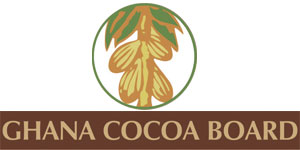Ghana Cocoa Board facts for kids
The Ghana Cocoa Board, also known as COCOBOD, is a special organization in Ghana. It is controlled by the Ghanaian government. COCOBOD helps cocoa farmers by setting a fair price for their cocoa beans. This protects farmers from big changes in world market prices. The organization also sells better quality cocoa seeds. They even do research to stop diseases that harm cocoa plants.
COCOBOD's main job is to help grow, sell, and process cocoa in Ghana. Ghana sends a lot of its cocoa beans to the United Kingdom. This organization was first set up a long time ago, when Ghana was a colony. Back then, it was called the Cocoa Marketing Board.
Contents
History of COCOBOD
How COCOBOD Started
In 1937, cocoa farmers in a place called Gold Coast were unhappy. Gold Coast was a British colony, which is now modern-day Ghana. European merchants were paying very low prices for cocoa. So, the farmers decided to stop selling their cocoa. This strike lasted for eight months!
The British government then stepped in. They created a group called the Nowell Commission. This group looked into the problem. The Nowell Commission suggested that the government should help cocoa farmers. They said a special Marketing Board should be created.
The First Board (1940–1946)
In 1940, the government formed the West African Produce Control Board. This board bought cocoa from all West African countries. They promised farmers a set price. This board worked during World War II. It was closed down in 1946.
The Cocoa Marketing Board (1947–1979)
The first real effort to control cocoa prices and production happened in 1947. This was when the Ghana Marketing Board was created. It started with a lot of money, about 27 million Ghanaian cedi. This board was later changed and became the Ghana Cocoa Board in 1979.
The Ghana Cocoa Board Today (1979–)
In 1984, COCOBOD made some big changes. They wanted the cocoa business to be more open to market forces. COCOBOD's role became smaller. Many employees, about 35,000 people, lost their jobs. The government also let private companies handle cocoa transport.
Money help for things like fertilizers and bug sprays was stopped. Some parts of cocoa processing were also privatized. A new payment system, called the Akuafo Check System, was started in 1982. This system helped farmers get paid for their dried cocoa beans.
Ghana's government decided in 1984 to control the sale of cocoa. Even with job losses, Ghana is still one of the top three cocoa-producing countries.
In 2018, Ghana and Côte d’Ivoire, the two biggest cocoa producers, teamed up. They started the Côte d’Ivoire – Ghana Cocoa Initiative. This group aims to get better prices for cocoa. People sometimes call it "COPEC," like the oil group OPEC.
In May 2024, COCOBOD planned to borrow money. They needed up to $1.5 billion to buy cocoa for the 2024/25 season. This was also to make up for low cocoa production. An earlier loan of $800 million had been delayed.
Buying Fertilizers Locally
In September 2019, the government of Ghana told COCOBOD to buy fertilizers from local companies. This started in 2020. Ghana has a program called "One-district One-factory." Because of this, local companies could make enough fertilizer for the country.
COCOBOD's Divisions
COCOBOD has several important divisions that help with its work:
- Cocoa Research Institute of Ghana
- Seed Production Division
- Cocoa Health and Extension Division
- Quality Control Company
- Cocoa Marketing Company
How COCOBOD is Run
The way COCOBOD operates is guided by a law. This law is called the Ghana Cocoa Board Act of 1984. In June 2024, COCOBOD hired a law firm. This firm was asked to suggest ways to update the 1984 law. They also looked at other laws that guide the cocoa industry.
See also
- Cocoa production in Ghana
- Agriculture in Ghana
- Canada Wheat Board, a similar organization that used to exist in Canada
- Côte d'Ivoire–Ghana Cocoa Initiative
 | Ernest Everett Just |
 | Mary Jackson |
 | Emmett Chappelle |
 | Marie Maynard Daly |


